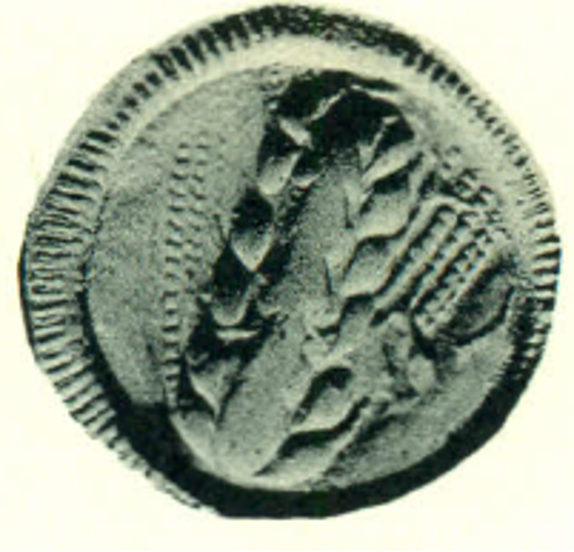1943 - Metapontum (nomos ear of barley/ear of barley) over Corinth (Pegasus/incuse square) (Charles Hersch coll. - Noe 1957, pl. VI, c): Difference between revisions
From SILVER
No edit summary |
|||
| Line 1: | Line 1: | ||
{{Overstrike | {{Overstrike | ||
|Image overstriking coin=SO 1215 - Metapontum over Corinth.png | |Image overstriking coin=SO 1215 - Metapontum over Corinth.png | ||
| | |Image overstruck variety=Corinth incuse square.jpg | ||
|Private collection= | |Image reference overstruck variety=https://pro.coinarchives.com/a/lotviewer.php?LotID=389991&AucID=705&Lot=391 | ||
|Private collection=Charles Hersch collection | |||
|Obverse legend=META | |Obverse legend=META | ||
|Obverse legend language=Greek | |Obverse legend language=Greek | ||
|Obverse description=Ear of | |Obverse description=Ear of barley with five grains. Decorated border. | ||
|Reverse description= | |Reverse description=Incuse ear of barley with [six] grains. Border of rays (incuse). | ||
|Mint=Metapontum | |Mint=Metapontum | ||
|Ancient region= | |Ancient region=Lucania | ||
|Date from=540 BCE | |Date from=540 BCE | ||
|Date to=510 BCE | |Date to=510 BCE | ||
|Period=Archaic | |Period=Archaic | ||
|Metal=Silver | |Metal=Silver | ||
|Denomination= | |Denomination=nomos | ||
|Standard=Achaian | |Standard=Achaian | ||
|Coin reference=Noe 1957, | |Coin reference=Noe 1957, group II, p. 21, pl. VI, c | ||
|Coin series reference=HN Italy, no° 1459, 1463, 1465, 1467, 1470, 1472, 1474, 1479, 1481-1486.; HGC 1, n° 1027-1029 | |Coin series reference=Noe 1957, group II, p. 21, pl. VI, c; HN Italy, no° 1459, 1463, 1465, 1467, 1470, 1472, 1474, 1479, 1481-1486.; HGC 1, n° 1027-1029 | ||
|Coin series web reference=https://greekcoinage.org/iris/id/metapontum.hn_italy.1459-81 | |Coin series web reference=https://greekcoinage.org/iris/id/metapontum.hn_italy.1459-81 | ||
|Overstruck obverse description= | |Overstruck obverse description=Pegasos with curled wing, bridled, to left. Beneath, Q | ||
|Overstruck reverse description= | |Overstruck reverse description=Incuse square with swastika pattern | ||
|Overstruck mint=Corinth | |Overstruck mint=Corinth | ||
|Overstruck ancient region=Peloponnesus | |Overstruck ancient region=Peloponnesus | ||
|Overstruck date from=540 BCE | |||
|Overstruck date to=520 BCE | |||
|Overstruck period=Archaic | |||
|Overstruck denomination=stater | |||
|Overstruck standard=Aeginetic | |||
|Coin series reference overstruck=Ravel 1936, n° 60; HGC 4, 1855 | |||
|Coin series web reference overstruck=https://greekcoinage.org/iris/id/corinth.calciati.1990.period_i.class_2; https://greekcoinage.org/iris/id/corinth.calciati.1990.period_i.class_3 | |||
|Frequency of overstrikes=frequent | |||
|Level of confidence=strong | |||
}} | }} | ||
Latest revision as of 06:23, 23 August 2023
540 BCE - 510 BCEMETA
Images
Overstruck variety

Corinth incuse square.jpg [1]
Location/history
| Private collection(s)Private collection(s) ᵖ: | Charles Hersch collection |
Overstriking coin
Description
| ObverseInscription or printing placed on the obverse.: | META (Greek) Ear of barley with five grains. Decorated border. | ReverseInscription or printing placed on the reverse.: | Incuse ear of barley with [six] grains. Border of rays (incuse). |
Mint and issuing power
| MintIdentifies the place of manufacture or issue of a numismatic object.: | Metapontum | Ancient regionAncient region. | Lucania | Modern countryModern country: Italy | AuthorityIdentifies the issuing power. The authority can be "pretended" when the name or the portrait of X is on the coin but he/she was not the issuing power. It can also be "uncertain" when there is no mention of X on the coin but he/she was the issuing power according to the historical sources: |
Chronology
| FromIdentifies the initial date in a range assigned in a numismatic context. 540 BCE toIdentifies the final date in a range assigned in a numismatic context.. 510 BCE | Archaic until 480 BC |
Physical description
| MetalThe physical material (usually metal) from which an object is made.: Silver |
DenominationTerm indicating the value of a numismatic object. Examples: tetradrachm, chalkous, denarius.: nomos | ||
| StandardStandard.: Achaian | |||
References
| Coin referenceReference of the Coin: | Noe 1957, group II, p. 21, pl. VI, c | Coin series referenceReference to coin series study: | Noe 19571Noe 1957, group II, p. 21, pl. VI, c, HN Italy2HN Italy, no° 1459, 1463, 1465, 1467, 1470, 1472, 1474, 1479, 1481-1486., HGC 13HGC 1, n° 1027-1029 |
| Coin series web referenceCoin series web references: | |||
Overstruck type
Description
| ObverseInscription or printing placed on the obverse.: | Pegasos with curled wing, bridled, to left. Beneath, Q | ReverseInscription or printing placed on the reverse.: | Incuse square with swastika pattern |
Mint and issuing power
| MintIdentifies the place of manufacture or issue of a numismatic object. ᵖ: | Corinth | Ancient regionAncient region. ᵖ | Peloponnesus | Modern countryModern country: Greece | AuthorityIdentifies the authority in whose name (explicitly or implicitly) a numismatic object was issued. ᵖ: |
Chronology
| FromIdentifies the initial date in a range assigned in a numismatic context. 540 BCE toIdentifies the final date in a range assigned in a numismatic context.. 520 BCE | Archaic until 480 BC |
Physical description
| DenominationTerm indicating the value of a numismatic object. Examples: tetradrachm, chalkous, denarius. ᵖ: | stater |
StandardStandard. ᵖ: | Aeginetic |
References
| Coin type referenceReference to coin series study ᵖ: | Ravel 19364Ravel 1936, n° 60, HGC 45HGC 4, 1855 | ||
| Coin series web reference overstruckCoin series web references overstruck: | |||
Additional data
| Frequency of overstrikesFrequency of overstrikes: | frequent | Level of confidenceLevel of confidence of the identification: | strong |
| RemarksRemarks: | |||
